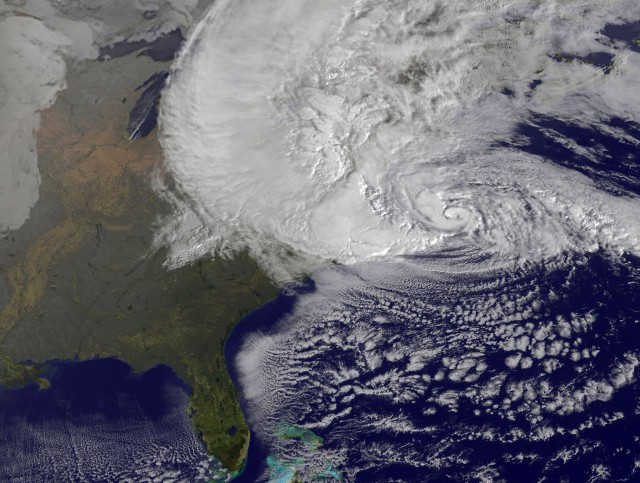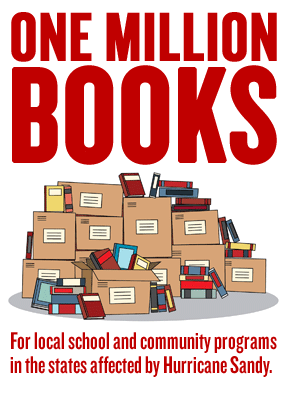 Since Hurricane Sandy struck the East Coast last fall, First Book has been working to help local schools, community programs and families rebuild their lost libraries.
Since Hurricane Sandy struck the East Coast last fall, First Book has been working to help local schools, community programs and families rebuild their lost libraries.
Now, thanks to our friends at Random House, we have the resources to rebuild tens of thousands of home and classroom libraries: over one million brand-new, high-quality kid’s books.
We just need to get the word out.
Help us by sharing this blog post with anyone you know who works with children in need, and tell them to sign up with First Book today.
Recognizing the wide-ranging impact of this storm on many aspects of children’s lives, schools and programs do not have to have been physically damaged by the storm to apply for books. Any school or program that was affected by the storm or serves children in need in one of the 13 affected states is encouraged to sign up to receive books.
NOTE: The books are available to schools and programs in the 13 states designated by FEMA as being affected by Hurricane Sandy: Connecticut, Delaware, Massachusetts, Maryland, New Hampshire, New Jersey, New York, Ohio, Pennsylvania, Rhode Island, Virginia, West Virginia, and Washington, DC.
The post One Million Books Available Now for Schools and Programs in States Affected by Hurricane Sandy appeared first on First Book Blog.

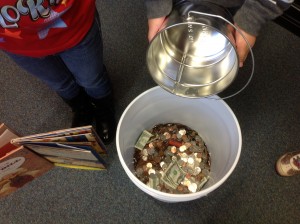 Hurricane Sandy caused much devastation to the East Coast. Families lost their homes, buildings were heavily damaged and countless children, families and schools lost libraries full of books.
Hurricane Sandy caused much devastation to the East Coast. Families lost their homes, buildings were heavily damaged and countless children, families and schools lost libraries full of books.
The students at Union Elementary School in Farmington, CT, decided to take action.
Some Union Elementary students came across First Book’s initiative to raise money to provide new books to children affected by Hurricane Sandy. They wanted to contribute to First Book’s effort, so they collected loose change for a month.
Mrs. Banta, the school’s main office clerk, hauled a big bucket of change to Farmington Savings Bank, and got a check for more than $400, enough to provide 160 brand-new books to children affected by Hurricane Sandy.
“The leadership, staff, teachers, students and families of Union School strongly share First Book’s belief that books are among the critical resources that children need every day, and we were so pleased with the strong response we received from everyone in collecting change to turn into dollars, then a check, then lots of books for kids,” said Jessica Lister, a Union Elementary School mom and publicity co-chair of the PTO.
Although the storm has passed, many families and children are still living in shelters and have lost many of their personal belongings. You can help just as the kids at Union Elementary did, by clicking here. Every $2.50 you contribute will provide a new book to a child affected by the storm.

By Caitlin Tyler-Richards
When Superstorm Sandy hit the United States’ east coast in late October, I was struck by the way in which oral historians and other like-minded academics responded to the ensuing chaos. This was not the first time I had seen oral history interact with natural disaster; one of the first articles I prepped for our Twitter feed was KUT News’ “Forged in Flames: An Oral History of the Labor Day Wildfires,” a multi-media documentation of the wildfires that overtook Texas in September 2011. However, to see the response in real time was a completely different experience.
Almost immediately, social media like the Storify stream set up by the Brooklyn Historical Society (@brooklynhistory) and hundreds of unbelieveable — and just plain untrue — instagram photos coalesced into a haphazard digital archive. More cohesive and comprehensive accounts, like Mike Chaban’s “The Committee to Save New York: An Oral History of Hurricane Sandy” and Carol Hill Albert’s “Coney Island Stories: Category One” appeared soon after. This rapid fire, occasionally heart-rending coverage led me to think more deeply on how oral historians in particular address major, traumatic events like Superstorm Sandy. Does one go to the damaged areas with the intention of conducting official, project-motivated Oral History Research (TM); or are the goals more personal and therapeutic? How, if at all, do one’s tactics change when conducting interviews with recent trauma survivors?
I didn’t have to go far for further insight. In addition to serving as our media review editor, Jennifer Abraham Cramer is the director of Louisiana State University’s T. Harry Williams Center for Oral History. She has worked on a number of oral history projects, including one on Hurricanes Katrina and Rita in 2005. We started off with what I thought was an easy question, “How did you become involved in post-Katrina research?”:
I was very reluctant to become involved with post-Katrina research, initially. Starting an oral history project in 2005 didn’t feel right to me—my husband’s family is from New Orleans, and we were still very much going through Katrina and Rita. Doing oral histories of a current event didn’t make a lot of sense to me at the time. Plus, I wondered, “Why spend time interviewing people about recent events when people who witnessed more distant events that are equally significant to our nation’s history are passing away, and taking their stories and memories with them?” I was also concerned about legal ramifications (ongoing court cases, criminal investigations, insurance claims, etc.) where respondents were discussing very recent events. Then, of course, the big issue with doing oral history projects around crisis events is that you don’t want to further traumatize your interviewee, exploit them, or paint them as helpless victims.
Despite her reservations, Cramer and the Williams Center decided to get involved with post-Katrina and Rita research, largely to ensure that the numerous oral history projects already in the works would follow the Oral History Association’sprinciples and best practices. If people were going into the field anyway, the Williams Center could ensure that the interviews they conducted “would be well-done, archived, and available to researchers.”
Given the concerns she expressed, I was curious to know what, if any obstacles Cramer faced during interviews, and if these challenges forced her to change her interview strategy. Here, especially as a historian-in-training, I was intrigued by the unique challenges post-Katrina research posed, and the manner in which Cramer thought through them:
The two big challenges were documenting recent events and conducting interviews with people who had recently experienced trauma. So firstly, using oral history methodology to document recent events is a bit challenging because of the different ways that people recall recent and past events. The brain has integrated causal relationships for distant happenings, but is more focused on the rich details of the “how” and “what” when it comes to more recent memories, thus affecting the way that respondents answer questions. Stories of recent events are a bit more scattered and thick with details, so you have to adjust your interviewing methodology.
Secondly, you have the challenge of interviewing people who have recently experienced crises. Trauma in oral histories is nothing new. For example, in the recording of a life narrative from a person who grew up in the 1930s and 40s in South Louisiana, it is likely that their story would include experiences with the 1927 Flood and the Great Depression. If they went to war, then you may have wartime violence and PTSD in a post-war America gearing up for a possible nuclear attack. Any oral historian conducting a life narrative interview will most definitely re-live a trauma with their interviewee. Most of these stories come naturally in the flow of the interview and are not necessarily the focus of the interview itself, and the narrator has integrated the trauma into their overall life story.
What was different about the Katrina and Rita interviews was that interviewees and even some interviewers were still living through the crises they were trying to document, and had not yet integrated those new hardships into their life story. This a major part of healing from PTSD and takes time. Thus, it became imperative to learn about the best way to conduct oral histories in the aftermath of crisis. I consulted my fellow oral historians located in the Gulf Coast region, and also sought advice from Mary Marshall Clark who had extensive experience documenting recent trauma with her project out of Columbia University, “September 11, Oral History, Memory and Narrative Project.” I also consulted professionals in the field of psychology about PTSD and interviewing. From all of this, I was able to outline some ethical considerations for interviewers here on the ground.
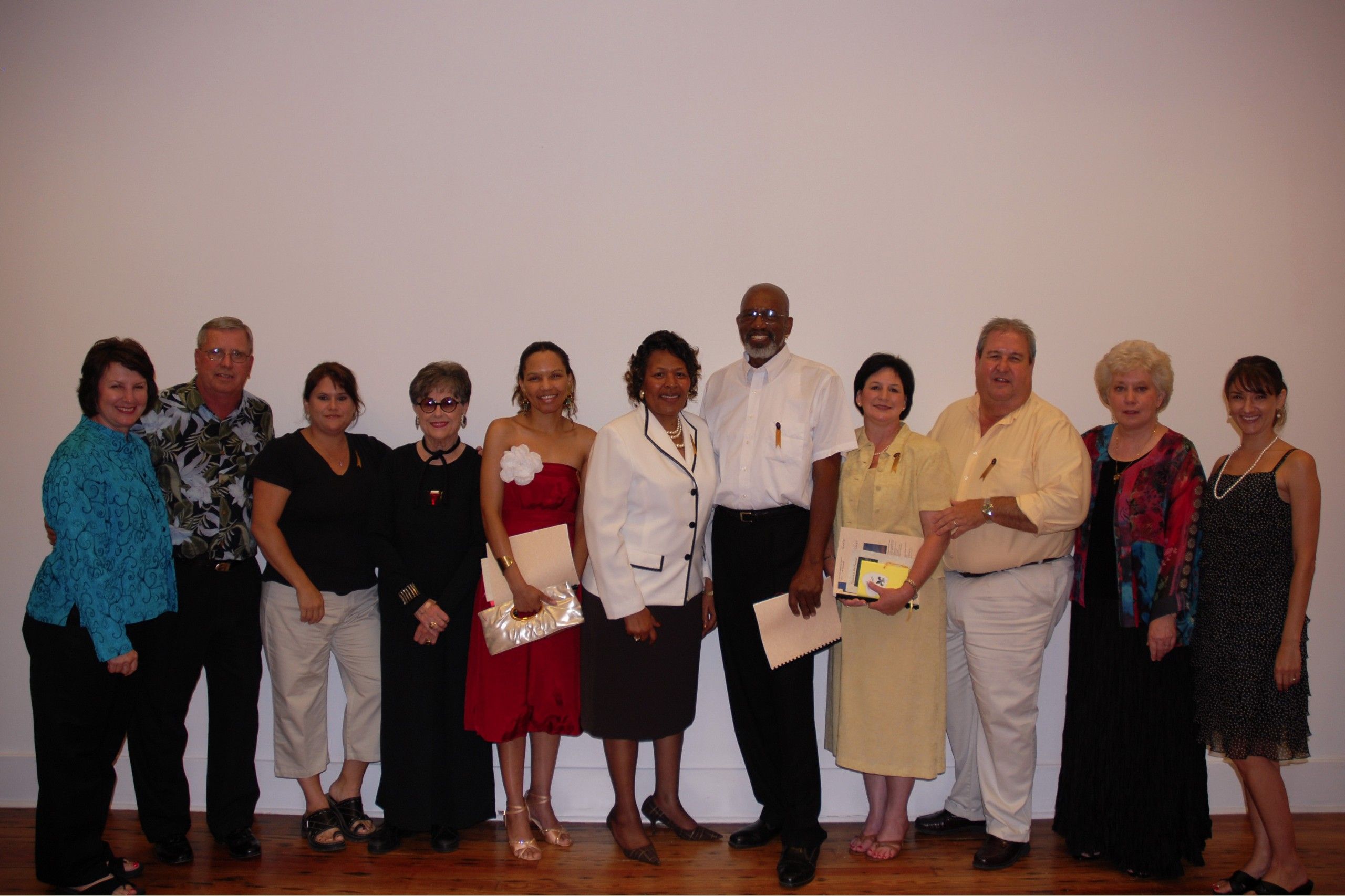
Taken at a reception held in 2007 to honor the interviewees who participated in the “Voices in the Storm Oral History Project,” sponsored by the Julien Poydras Museum Arts Council in Pointe Coupee Parish. Those photographed include 8 interviewees and 3 interviewers, including interviewee Jen Abraham Cramer (far right). The project documents stories of those who relocated from New Orleans to New Roads, Louisiana, in the aftermath of Hurricane Katrina. New Roads is one of the oldest settlements in Louisiana and has long-standing historic and cultural ties to the city of New Orleans. The Williams Center consulted in the design and implementation of the project and houses the collections at the Center in the LSU Libraries Special Collections.
While recognizing that new memories, especially those of recent trauma survivors, carry a raw, emotional and largely unprocessed weight to them, Cramer did not have any illusions regarding the healing power her interviews might provide:
There is no doubt that story-telling can be therapeutic. But, we as oral historians are trained to document while therapists are trained in their field with entirely different goals. Oral historians record stories that offer experiential information in order to create primary sources that are preserved and made available to the public. It is wonderful when, through the course of an oral history interview, we can help the interviewee heal as perhaps part of their therapy, but I believe that it’s best for oral historians to stick to the overall goal of documenting — while being especially careful with respondents who have recently experienced trauma.
I closed our e-exchange with the most pragmatic question, “Any advice for those conducting oral history projects following natural disasters?” — the answer to which I hope everyone will print out and tape to their walls:
Basically the guidelines I mentioned earlier: It may be helpful to seek training from professionals in the field of psychology, if possible. For the purposes of our projects at the Center in the aftermath of Hurricanes Katrina and Rita, the Red Cross provided lists of what not to say to survivors of disasters, which I in turn provided to interviewers. I encouraged interviewers to conduct life narratives so that the hurricane story was situated within a larger context—this included previous storm stories like Hurricane Betsy. I also encouraged them to stay away from asking about emotions and feelings, and to focus more on what the interviewee experienced and witnessed, yet to be compassionate when emotions arose. Interviewers were encouraged to honor the interviewees in some way—whether at a community event or in a final product given to the interviewees, and to include them in every step of the project.
Most importantly, the interviewers were encouraged to follow up on their interviews five years or ten years later to create a longitudinal documentation and commemoration. In addition, I incorporated Clark’s suggestions to ensure that interviewers have certain training and skills: the ability to connect emotionally to the narrator and to create a supportive listening environment; to be concerned, but not intrusive; to connect interviewees with each other; and to ask questions that may help the interviewee with explanatory stories.
As always, we’ll close here by turning it over to our readers. Have any of you conducted research following natural disasters and have insights you’d like to share? Or do you have a project in mind and need more advice on how to tackle some of the obstacles Cramer mentioned? To the comments, everyone!
Jennifer Abraham Cramer is the Director of Louisiana State University’s T. Harry Williams Center for Oral History, where she manages multiple ongoing staff and partner projects and oversees the processing, preservation, digitization, and public access of the Center’s 5,000 hours of audio recordings. She is the creator and producer of the Center’s podcast, “What Endures,” and currently serves as the media review editor for The Oral History Review.
Caitlin Tyler-Richards is the editorial/ media assistant at the Oral History Review. When not sharing profound witticisms at @OralHistReview, Caitlin pursues a PhD in African History at the University of Wisconsin-Madison. Her research revolves around the intersection of West African history, literature and identity construction, as well as a fledgling interest in digital humanities. Before coming to Madison, Caitlin worked for the Lannan Center for Poetics and Social Practice at Georgetown University.
Subscribe to the OUPblog via email or RSS.
Subscribe to only history articles on the OUPblog via email or RSS.
The post Oral history in disaster zones appeared first on OUPblog.

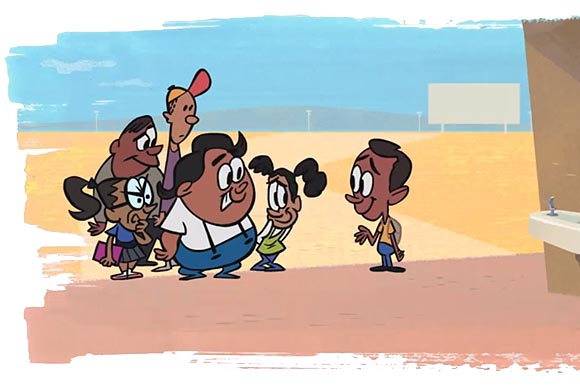
Though the stories about Hurricane Sandy have dropped off the front page, there are tens of thousands victims who have been made homeless or are still lacking basic services like electricity, heat and clean water. One person from the animation community who has been deeply involved with the recovery effort is Mike Rauch, who is one of the brothers behind the animation house Rauch Brothers.
Tomorrow, November 14, the Rauch Brothers will be hosting a screening and Q&A about their much-admired series of StoryCorps shorts. Though the event had been planned for some time, in light of the recent disaster, the brothers have turned it into a relief benefit for Hurricane Sandy victims. Tickets are $10 and all proceeds will go directly toward hurricane relief efforts.
The event, which begins at 7pm, will take place at the Brooklyn Music School (126 St. Felix St, Brooklyn, NY 11217). Attendees are also encouraged (though not required) to bring items for those impacted:
No more clothing is needed so please bring items from this list instead: flashlights, aaa batteries, gallon ziplock bags, brooms, flat shovels, mops, masks and gloves, any sort of baby/toddler food and formula, duct and scotch tape, deodorant, tampons, soap, can openers.
Tickets can be purchased in advance through this link.
Last night, four First Book employees, with help from American Federation of Teachers’ volunteers, ventured to a small alley in the financial district of New York City to unload, label and sort 30,000 children’s books for victims of Hurricane Sandy.
The American Federation of Teachers and their local New York affiliate, the United Federation of Teachers, requested 30,000 new books from First Book to go to kids in the affected areas. To get the books there on time, First Book staffers loaded a 26-foot truck with the 30,000 books yesterday afternoon and drove them to a warehouse in lower Manhattan.
Anna Taleysnik-Mehta, who headed up First Book’s efforts, stated:
“Books for tomorrow ready to go, almost all the rest are up in storage and being sorted; we just did a day of work in an hour and change thanks to the amazing building crew and AFT and First Book staff”
We couldn’t be more grateful for the volunteers who lent their support to this effort. Our thoughts continue to be with the millions of Americans who are still impacted by this storm.
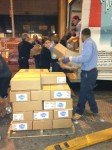

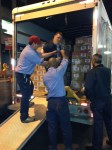
If you are interested in providing books to children in need who are affected by Hurricane Sandy to help them get through this challenging time, please donate.

Whoa! the past two weeks have been chaotic as most people on the East Coast know. Dad's in the hospital with pneumonia. I'd like to blame Sandy but I don't think a hurricane can cause pneumonia. So there's been a lot of to-ing and fro-ing.
In the meantime, family members are arriving from all over because Dad is pretty sick. Poor Dad!
Anyway, KBWT did not happen this week but I just found a website that I am going to use A LOT! Carol Hurst's Children's Literature Site. Teachers and children's activity leaders will LOVE this site. Helpful reviews, booklists, a newsletter, links to other helpful sites, lesson plans! So much useful well-organized stuff.
I needed a resource list for cities and towns because today is World Town Planning Day and Carol Hurst's site had an excellent list with books I SHOULD have remembered to include in my program tonight. I just signed up for Carol's newsletter so that I never forget this site again. YAY!

And World Town Planning Day reminds me of one of my favorite towns - Richard Scarry's Busy Town!! CBS has a great site based on their
Busy Town Mysteries show. Check it out
Oh that Sandy! What a character! She blew out the power in millions of homes, including my parents. So, since no one else has power, Mom and Dad stayed with Hub and I until this morning. My Reader's Theater event - featuring the works of the amazing David Lubar and the talents of 11 of Nazareth's finest 4th, 5th and 6th graders - was moved from Tuesday to Thursday but went off very well - prop malfunctions and all.
The Son, DIL and most adorable grand-daughter also stayed here - but in the apartment where the other grandmother lives. So we got to see Her Sweetness every day.
My Dad is not doing all that well (understatement alert) so my youngest sister flew in from the West Coast to "help out". What a blessing! And I can not say enough about what a wonderful husband I have.
Hold us in the Light as we travel the continuously rocky terrain of the land of ailing elders.
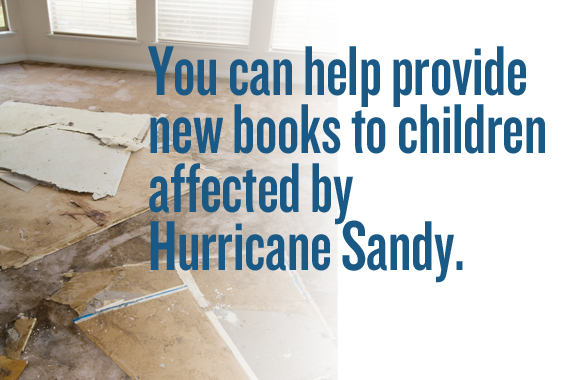 As first-responders are working to provide these families with electricity, water, and other critical resources, First Book—in partnership with our local volunteers and partners—is raising funds to restock school and home libraries. After distributing more than 5 million books in the aftermath of Hurricane Katrina, we know new books can be valuable lifelines for those whose worlds have been turned upside down.
As first-responders are working to provide these families with electricity, water, and other critical resources, First Book—in partnership with our local volunteers and partners—is raising funds to restock school and home libraries. After distributing more than 5 million books in the aftermath of Hurricane Katrina, we know new books can be valuable lifelines for those whose worlds have been turned upside down.
Your help will ensure that children in need will have new books — stories at bedtime, the chance to be transported to another world, and the opportunity to return to normalcy.

Every $2.50 you contribute will provide a new book to a child affected by the storm.
Your impact will also be DOUBLED as each gift of $2.50 will be matched by an additional book from First Book’s publishing partners.

 Since Hurricane Sandy struck the East Coast last fall, First Book has been working to help local schools, community programs and families rebuild their lost libraries.
Since Hurricane Sandy struck the East Coast last fall, First Book has been working to help local schools, community programs and families rebuild their lost libraries.


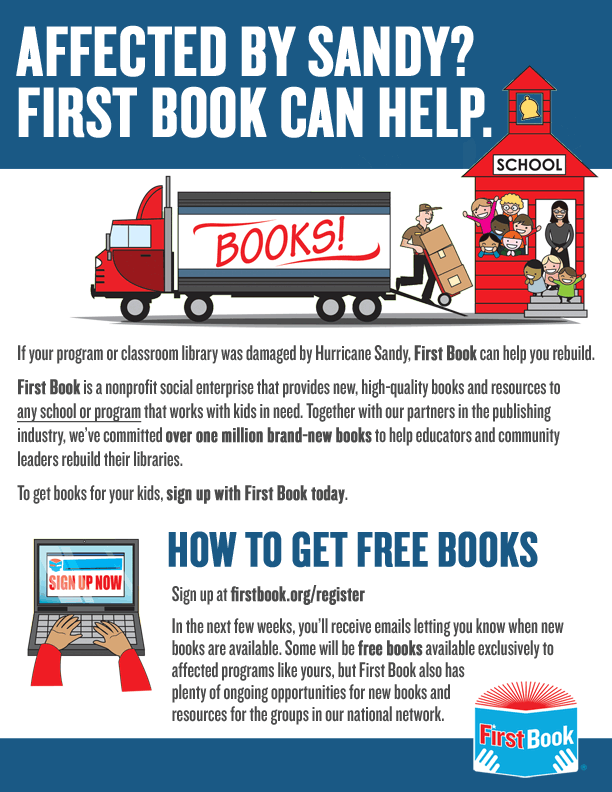








 As first-responders are working to provide these families with electricity, water, and other critical resources, First Book—in partnership with our local volunteers and partners—is raising funds to restock school and home libraries. After distributing more than 5 million books in the aftermath of Hurricane Katrina, we know new books can be valuable lifelines for those whose worlds have been turned upside down.
As first-responders are working to provide these families with electricity, water, and other critical resources, First Book—in partnership with our local volunteers and partners—is raising funds to restock school and home libraries. After distributing more than 5 million books in the aftermath of Hurricane Katrina, we know new books can be valuable lifelines for those whose worlds have been turned upside down. 